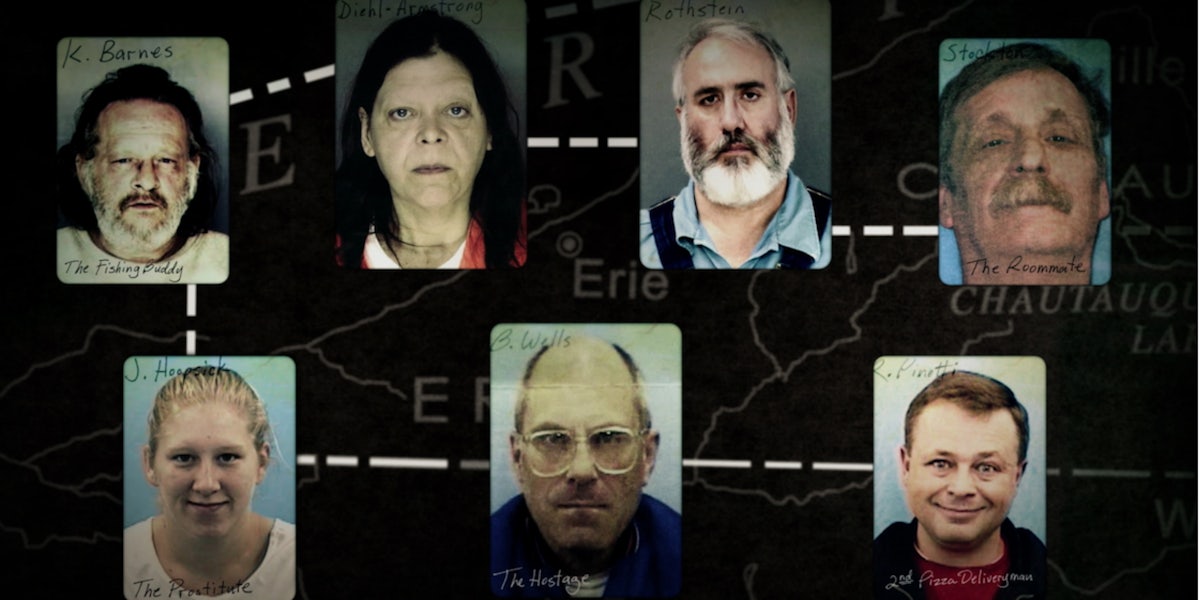In August 2003, pizza delivery driver Brian Wells robbed a bank in Erie, Pennsylvania, with a bomb strapped to his neck. He didn’t get far: Wells died after the bomb exploded, his agonizing last minutes caught on police dash cams.
The mind-boggling crime, also known as the collar bomb heist and the pizza bomber, is the starting point for Netflix’s Evil Genius: The True Story of America’s Most Diabolical Bank Heist. Before we’re taken through the truly bizarre events of that day, we’re introduced to Marjorie Diehl-Armstrong, a longtime Erie resident who, we’re told, had a difficult childhood and later developed mental illness. Any further analysis will have to wait, though.
The four-part series, produced by the Duplass brothers and directed by Barbara Schroeder, devotes its first episode to Wells, who was supposed to be sent on a macabre scavenger hunt after robbing the bank. A stoic coroner explains that they had to decapitate Wells (in a “caring way”) in order to get the clunky bomb off, something his family was not happy about. He’s painted as a quiet man who happened to get involved with some bad elements, but over four episodes that focus gets softer.
The series is its own scavenger hunt, and though it places emphasis on Diehl-Armstrong as the mastermind of the robbery, it takes its time sifting through other suspects and theories, as well as interviews with Wells’ acquaintances, FBI officials, and Erie cops who were on the scene. In the second episode, Evil Genius zeroes in on Bill Rothstein, a former lover of Diehl-Armstrong who called the cops on her after she allegedly asked him to get rid of a body in her freezer. Rothstein died in 2004, so we’re left mainly with interrogation video and a surreal clip of Rothstein going through Diehl-Armstrong’s cluttered home with investigators after her arrest.
The first two episodes set up a strong foundation, one where it’s not clear who did what. But then producer Trey Borzillieri pops up without much of an introduction; he narrates portions of Evil Genius and got access to Diehl-Armstrong when she was imprisoned for the murder of James Roden, the man in her freezer. He and Schroeder shape the second half around interviews with her, her father, and acquaintances, but his role as narrator and guide is somewhat obscured, and we rarely see him on-screen. He developed an interest in the case in 2003, he tells us, but beyond that, we really have no sense of who he is.
Not that we end up with a real sense of who Diehl-Armstrong is, either. She was tried in 1984 for the murder of her boyfriend but got off on a claim of self-defense. She was a hoarder and a narcissist. Borzillieri talks to her father and a few fellow inmates who spent time around her, but for such a big, complex personality, details about what led her to that point are fuzzy.
The doc is split into two halves: one where a truly incredible crime is laid out and a cast of suspects introduced, and one where Borzillieri is now actively participating in questioning and developing something of a friendship with the suspect. Still, he admits he was skeptical and asks why he’s even entertaining Diehl-Armstrong’s manipulations. (She was eventually convicted for her role in the robbery in 2010, as was Kenneth Barnes in 2008. She died in 2017.)
Evil Genius does try to unpack the spectacular bungling of the case. It ponders why no one considered Rothstein a suspect at the time, and why, when Diehl-Armstrong publicly stated that he killed Wells, no one followed up on that. At least one ATF agent admits they missed clues. Geraldo Rivera strode into Erie in 2005 and drummed up more confusion about the case; he also took shots at the national agencies that were supposed to be investigating it.
The Duplass brothers had a hit with March’s Wild Wild Country, another documentary with a vexing, complex subject. That series is more expansive and looks more cinematic. There’s a flat, grainy hue infused into Evil Genius, which is perhaps by design. It’s a fascinating crime, but there’s not much happiness in the series. It doesn’t offer any tidy endings or a clear motive, but it does shine a light on a piece of history lost to time.
Still not sure what to watch on Netflix? Here are our guides for the absolute best movies on Netflix, must-see Netflix original series and movies, and the comedy specials guaranteed to make you laugh.
